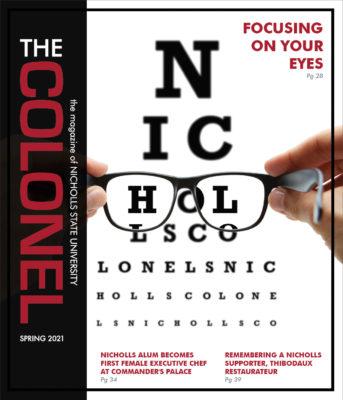A Man Worth Following
Carlyn James will never forget that day. It was Aug. 31, 1991, and she was just seven years old. A glossy photograph retrieved from the Clarence James Jr. Alumni House shows her wearing a dark blue dress with white trim, white shoes and stockings and a white bow pinned in her hair.
She is speaking into a microphone, leading a group of family and friends in the Pledge of Allegiance. It was an honor, she says over the phone 29 years later, to speak at the dedication of the Alumni House in her father’s name.
“I felt like I was holding it down,” she says.
Former Nicholls President Donald Ayo (DIP ’54) remembers James as a “unique individual.”
“I don’t think there was a person that he did not capture. It was his personality that he was a very giving person,” says Ayo, who served as president from 1983 to 2003. “He had a great quality of a listener. His love for Nicholls and the community was clear. There’s nothing I can say negative about him.”
The 1960s are a decade characterized by change and progress in the struggle for Civil Rights in America. In 1966, two years after the Civil Rights Act was signed, the Supreme Court ruled in Brown v. Louisiana that a silent sit-in demonstration protesting segregation in a public library was protected symbolic speech under the First and 14th Amendments. That year James graduated from C. M. Washington High School, a school named after Cordelia Matthews Washington who dedicated her life to the education and empowerment of Black people.
After graduation, he decided to join the Marines and served in the War in Vietnam. This decision would impact the remainder of his life and offer him opportunities to impact others’ lives.
James survived his year-long tour in Vietnam and earned a Purple Heart after contracting cancer. He had been exposed to Agent Orange and had his right hand wounded in battle. Despite his ailment, James continued to give to his community after returning to Thibodaux.
“He asked the Lord to give him a chance to go back, so when he was returned home, he did what he set out to do,” his wife Carolyn says.

“He promised to make something of his life. Seems to me that he kept his promise to God.” – Carlyn James
He graduated from Nicholls in 1976 with a degree in general business. As a student, he served as president of Delta Alpha Kappa, and as a Student Government Association senator. He was the first African-American to be chosen as Mr. Nicholls. While in school, James honed business skills while demonstrating generosity and the ability to connect with people.
As a graduate, he opened The Finance Center of Thibodaux, which served members of the community aiding with their day-to-day needs. He was elected to the Nicholls Alumni Federation board of directors, and in 1988, he received the James Lynn Powell Outstanding Alumni Award, the highest award given to a Nicholls graduate.
“When people want to do it, they can do it,” says Dr. Cleveland Hill (BA ’73, MEd ’79). “He became a person who knew exactly what he wanted to do in life.”
Carlyn adds, “My Dad was always going to some banquet because he was always giving these speeches and accepting some award. So it was the norm.”
James and Carolyn had three kids: Carlyn, Chase and Chad. Carlyn says she has always looked up to her father.
“I was my Daddy’s shadow,” she says. “See, when you’re a King or a Queen, that’s how you have to have your children. We all know how to conduct ourselves. We all have to be ready to represent. That’s how my Daddy was. He was a man worth following. He led by example.”
His children still remember and live by his lessons. They say he taught them to have a sense of direction and a sense of self. He taught them to adapt. Chase says his father pushed him to work hard and strive to do his best.
“I am humbly inspired by him as a father and as a business owner,” he says.
For Nicholls to follow through on renaming the alumni house after James when the building was only a couple of years old spoke to his character, Dr. Hill says.
“For them to get that done at the time that it was done, it was pretty remarkable,” Hill says. “And if I recall right, there was not too much opposition to it. This was a testament to C.J.’s character. He was well-liked by all communities.”
Carlyn recalls how his generosity persisted even as he was in the hospital. After hearing a woman suffering, he asked the nurses to help her before seeing about his well-being.
“He really would have liked to be a doctor,” she says. “He was shot and wounded in his right hand in the Vietnam War. It was permanently damaged. He didn’t complain when he was diagnosed with cancer because God gave him a second chance when he was shot and wounded in the war. He promised to make something of his life. Seems to me that he kept his promise to God.”
From using his position to impact the larger community to capturing the hearts of individuals, James carried out an indelible purpose with his time and energy. Carlyn recalls how her father, an avid photographer, attended her first communion.
Clarence James Jr. died on Aug. 21, 1990. He is buried at St. Joseph Cemetery in Thibodaux. For Carlyn, more than memories remain.
“I feel like my ancestors are watching over me,” Carlyn says. “Today, when I think about the value of my father’s legacy, I think about the future of his community. I recently heard a wise man say: ‘Don’t let anyone tell you that you have lost something. For when you know where something is, it is not truly lost.” – Farren Clark (BA ’03)



